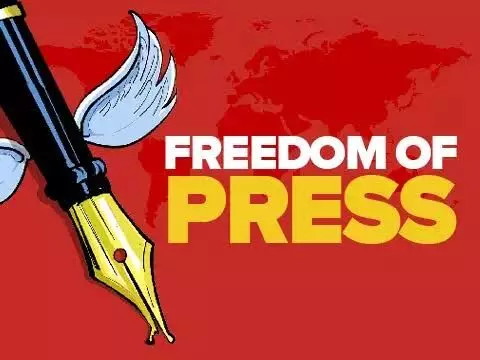Silencing the Feed: India’s Press Freedom Under Scrutiny as X Sounds Alarm

In a significant move that has ignited global debate, Elon Musk-owned social media platform X (formerly Twitter) has openly criticized the Indian government's alleged clampdown on press freedom, following a controversial order to block the accounts of 2,355 users, including that of global news agency Reuters. The directive, issued on July 3 under Section 69A of India’s Information Technology (IT) Act, prompted a sharp statement from X’s Global Government Affairs team, which accused the Ministry of Electronics and Information Technology (MeitY) of demanding account suspensions without due justification and with impossible urgency.
X, once a quiet facilitator of online discourse in India, now finds itself in direct confrontation with one of the world’s largest democracies—a country often hailed for its vibrant media and political plurality, but increasingly criticized for growing authoritarian control over digital spaces. The controversy has triggered fresh concerns about the direction India is headed in terms of civil liberties, especially as digital platforms become the primary arena for dissent and journalism.
According to X’s statement, the Indian government’s order gave the platform just one hour to comply with the mass blocking—an order, X claims, came without explanations or due legal process. Failure to comply would mean criminal liability for company officials in India. The blocked accounts, notably including Reuters and its regional handles, remained suspended until the government partially reversed its decision following public outrage. Yet, the damage had already been done.
Section 69A of the IT Act allows the government to issue content-blocking orders in the interest of national security, sovereignty, or public order. However, the provision has been widely criticized for its opaque procedures and lack of judicial oversight. Legal experts and digital rights advocates argue that the clause effectively provides the government sweeping powers to silence voices under the vague pretext of national interest—without transparency or accountability.
India’s recent ranking of 159 out of 180 countries in the 2024 World Press Freedom Index published by Reporters Without Borders (RSF) serves as an alarming backdrop. The report cited increasing pressure on independent journalism and state-backed intimidation of critical voices. The blocking of a globally respected outlet like Reuters underscores the precarious state of media freedom in India. If a multinational wire service with decades of credibility can be silenced—however briefly—what does that signal to smaller, local, or dissenting media entities?
This is not the first time the Indian government has clashed with X. In 2021 and 2022, during the farmers' protests and various communal tensions, the government demanded mass takedowns of tweets and user accounts. At that time, Twitter complied reluctantly and even challenged some of the orders in court. But with Musk’s acquisition of Twitter and its transformation into X, the platform has attempted to redefine its posture—championing free speech and resisting what it views as unjust censorship.
Yet, X also acknowledged its legal limitations in the Indian jurisdiction. Unlike users within the country, the platform cannot directly challenge executive orders unless it defies the law—an action that may lead to criminal proceedings against its employees or restrictions on its operations in India. This highlights the vulnerability of global digital platforms when navigating the complex, often conflicting landscapes of national law versus international norms on freedom of expression.
The incident also throws light on the delicate dance of diplomacy and corporate interest. Just months ago, Elon Musk met with Prime Minister Narendra Modi during his U.S. visit—a high-profile encounter that included Musk’s family and was widely touted as a sign of closer cooperation. The agenda included Tesla’s entry into India, a potential Gigafactory, and renewable energy initiatives. Musk, no stranger to leveraging state relationships, has often aligned with power for business advantage. That his platform is now challenging the very government he recently praised raises questions about the nature of corporate integrity and the limits of neutrality in geopolitical hotspots.
Moreover, the fact that the order was partially rolled back after public backlash speaks volumes about the power of collective digital dissent in India. It shows that while government control over platforms is expanding, public opinion still holds sway—albeit tenuously. This presents a critical opportunity for civil society, media organizations, and digital rights groups to push back against opaque censorship and demand greater transparency and judicial scrutiny.
The Indian government has yet to provide a comprehensive explanation for the blocking order, especially regarding Reuters. Silence from official quarters only adds to the unease, as such actions fuel narratives of state overreach and damage India’s global image as a democratic marketplace of ideas. In an age where perception is power, this episode risks pushing India into the same breath as more overtly authoritarian regimes that stifle press freedom under the guise of national security.
Ultimately, the confrontation between X and the Indian state is emblematic of a larger struggle unfolding across the world—between digital sovereignty and global free speech norms. As governments seek to control the narratives within their borders, platforms like X are finding themselves both weaponized and shackled, torn between compliance and conscience.
India stands at a crossroads. It can choose to respect the democratic ideals that have long been its pride and allow critical voices—including global media—to flourish. Or, it can continue down the path of opaque censorship and executive control, risking both domestic credibility and international standing.
Either way, the world is watching. And so are 1.4 billion Indians, many of whom still believe that democracy demands dissent—not its deletion.
